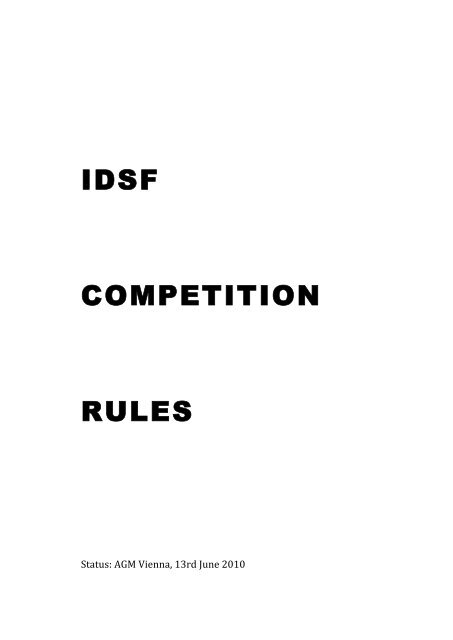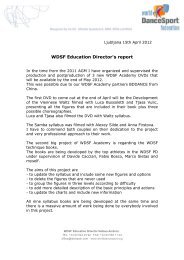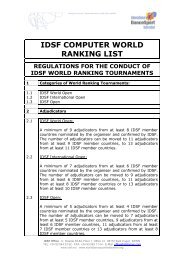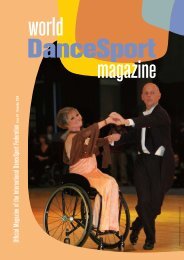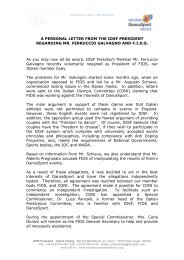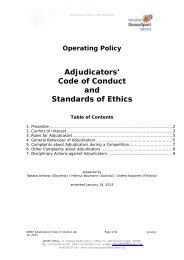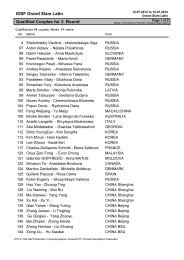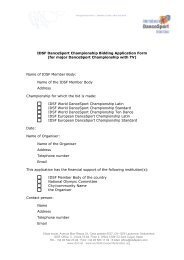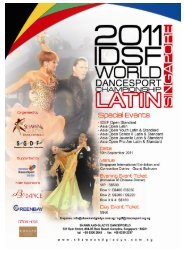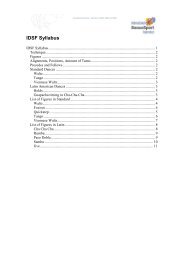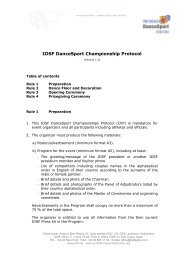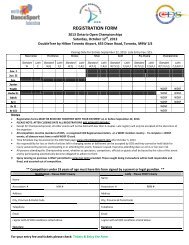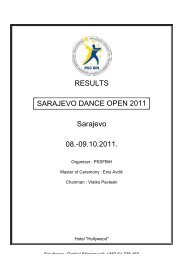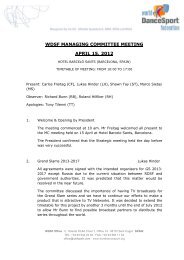IDSF COMPETITION RULES - World DanceSport Federation
IDSF COMPETITION RULES - World DanceSport Federation
IDSF COMPETITION RULES - World DanceSport Federation
Create successful ePaper yourself
Turn your PDF publications into a flip-book with our unique Google optimized e-Paper software.
<strong>IDSF</strong><strong>COMPETITION</strong><strong>RULES</strong>Status: AGM Vienna, 13rd June 2010
LIST OF CONTENTSRULEControlling organization 1Application 2Prize money 3Advertising 4Grades of Competitions 5<strong>IDSF</strong> <strong>World</strong> Championships 5.1<strong>IDSF</strong> Open <strong>World</strong> Championships<strong>IDSF</strong> Continental Championships<strong>IDSF</strong> Sub-Continental Championships 5.4<strong>IDSF</strong> <strong>World</strong> Ranking Tournaments 5.5International Invitation Competitions 5.6International Invitation Competitions for Formation Teams 5.7<strong>IDSF</strong> <strong>World</strong> Cups 5.8<strong>IDSF</strong> Continental Cups 5.9International Team Matches 5.10Open Competitions 5.11Lifts 5.12<strong>IDSF</strong> Standard Freestyle and Latin Freestyle Competitions 5.13Time allowed and TempiRestrictions of syllabus5.25.35.145.15Right to organize competitions 6Invitations 7Reimbursement of expenses 8Drug Abuse 9Procedure for International Competitions 10Age Restrictions 11Competition Cress 12Couples 13International Formation Championships 14Authority of the Presidium 15Application of these Rules 16
<strong>IDSF</strong> <strong>COMPETITION</strong> <strong>RULES</strong>Rule 1Controlling organizationThe International Dance Sport <strong>Federation</strong> (<strong>IDSF</strong>) is the governing body for all <strong>DanceSport</strong>competitions and athletes, including amateur competition at all levels, in each country through thatcountry’s <strong>IDSF</strong> Member body, and internationally. The only <strong>DanceSport</strong> competition that the <strong>IDSF</strong>does not claim to govern and maintain jurisdiction over are those specially declared to be excluded,or to be excluded for a period of time, by the authority of the <strong>IDSF</strong> Presidium.The <strong>IDSF</strong> is the sole authority worldwide for the determination of amateurs’ status. Subject to<strong>IDSF</strong>’s Statutes and Competition Rules, and subject to the policies established by the GeneralMeeting and any agreements or policies established or entered into by the Presidium, right of entryby competitors to <strong>IDSF</strong> national or international competitions (including all amateur competitions)is delegated to the relevant <strong>IDSF</strong> member body.Rule 2Application1. These <strong>RULES</strong> apply to all international <strong>IDSF</strong> <strong>DanceSport</strong> Competitions organized by an <strong>IDSF</strong>member body, including but not restricted to Standard, Latin-American, New Vogue,American Style, Rock’n Roll, Old Time and Modern and Latin Sequence. Rules for Rock’nRoll are administered by the <strong>IDSF</strong> Associate Member the <strong>World</strong> Rock’n Roll Confederation.2. The <strong>IDSF</strong> Presidium is responsible for seeing that these <strong>RULES</strong> are observed.3. For specific events the Presidium may impose supplementary rules on the organizer.4. All competitors in <strong>IDSF</strong> Competitions must be a member of the national <strong>IDSF</strong> memberbody.Rule 3Prize moneyIn <strong>IDSF</strong> <strong>DanceSport</strong> Competitions prize money can be paid up to the amount of prize money paidby <strong>IDSF</strong> in <strong>IDSF</strong> <strong>World</strong> Open. If an organizer offers more prize money than in <strong>IDSF</strong> <strong>World</strong> Open heneeds the approval of the <strong>IDSF</strong> Presidium.Rule 4Advertising and competition numbers1. In all <strong>IDSF</strong> granted <strong>DanceSport</strong> Competitions advertising by up to four sponsors is allowedon competition costumes. The man is allowed to advertise up to three sponsors, and thelady only one sponsor. The size of the advertisement may be no more than 40 square cmfor each sponsor. Such advertising may only be displayed and located on the waist, chestor sleeves.2. Advertising on the competition number of the couple is limited to 20 % of the size of thecompetition number.2
<strong>IDSF</strong> <strong>COMPETITION</strong> <strong>RULES</strong>3. The size of couples’ competition number cards has to be up to DIN A5 plus 20 % reservedfor advertising. Couples have to accept the number card as issued and are not allowed totamper with or reduce the size of the number card.Rule 5Grades of competitions1. <strong>IDSF</strong> <strong>World</strong> Championships1.1 Adult and Youth and Junior IIa) Types of competitions:<strong>IDSF</strong> <strong>World</strong> Championships are heldaa)ab)ac)ad)in the Standard dances (Waltz, Tango, Viennese Waltz,Slow Foxtrot and Quickstep)in the Latin American dances (Samba, Cha-Cha-Cha,Rumba, Paso doble and Jive)over Ten Dances (Standard and Latin American)in Formation dances (Standard and Latin American),RULE 14, paras 2-13 must be observed. -only Adultb) Invitations:Invitations are to be sent to all <strong>IDSF</strong> member bodies.c) Entitled to participate:Every <strong>IDSF</strong> member body has the right to nominate two couples.<strong>IDSF</strong> <strong>World</strong> Ten Dance ChampionshipsOnly one couple may represent each member body<strong>IDSF</strong> <strong>World</strong> Formation Championships:Two teams of each category must be invited from each member body.d) Reimbursement of expenses:Reimbursement of expenses, see RULE 8.1.2 Senior Ia) Types of competitions:<strong>IDSF</strong> <strong>World</strong> Senior Championships are heldaa)ab)in the Standard dances (Waltz, Tango, Viennese Waltz, Slow Foxtrot andQuickstep).in the Latin American dances (Samba, Cha-Cha-Cha, Rumba, Paso dobleand Jive)b) Invitations:Invitations are to be send to all <strong>IDSF</strong> member associations.c) Entitled to participate:Every <strong>IDSF</strong> member body has the right to nominate two couples.3
<strong>IDSF</strong> <strong>COMPETITION</strong> <strong>RULES</strong>d) Reimbursement of expenses:No travel expenses, one overnight hotel accommodation.Chairman and Adjudicators according to RULE 8.e) Age limit:Competitors in International Senior Championships must in the calendar year inwhich the Championship is held have reached at least their 35th birthday (bothpartners).2. <strong>IDSF</strong> OPEN WORLD CHAMPIONSHIPS2.1 Senior Ia) Type of competitions:2.2 Senior IISenior I Open <strong>World</strong> Championships are held:a) In the Ten Dances (Standard and Latin American).b) Invitations:Invitations must be sent to all <strong>IDSF</strong> Member bodies.c) Eligibility:All couples of the highest competitive category of an <strong>IDSF</strong> Member body are eligibleto participate, but a couple’s application for entry may only be made by therelevant <strong>IDSF</strong> Member body.d) Reimbursement of expenses:No travel expenses, no hotel accommodation, provided that all couples advancingto the quarter-final shall be paid a minimum lump sum reimbursement ofCHF150,00. Reimbursement of <strong>IDSF</strong> Chairman and <strong>IDSF</strong> Adjudicators shall be madeby the Organizers according to Rule 8.a) Type of competitions:Senior II Open <strong>World</strong> Championships are held:aaabIn the Standard Dances (Waltz, Tango, Viennese Waltz, Slow Fox Trot,Quickstep)In the Latin American Dances (Samba, Cha Cha Cha, Rumba, Paso Doble,Jive)b Invitations:Invitations must be sent to all <strong>IDSF</strong> Member bodiesc Eligibility:All couples of the highest competitive category of an <strong>IDSF</strong> Member body are eligibleto participate, but a couple’s application for entry may only be made by therelevant <strong>IDSF</strong> Member body.d Reimbursement of expenses:No travel expenses, no hotel accommodation, provided that all couples advancingto the quarter-final shall be paid a minimum lump sum reimbursement of CH4
<strong>IDSF</strong> <strong>COMPETITION</strong> <strong>RULES</strong>150,00. Reimbursement of <strong>IDSF</strong> Chairman and <strong>IDSF</strong> Adjudicators shall be made bythe Organizers according to Rule 8.3. <strong>IDSF</strong> Continental ChampionshipsAdult and Youtha) Types of competitions:<strong>IDSF</strong> Continental Championships are heldaa)ab)ac)ad)in the Standard dances (Waltz, Tango, Viennese Waltz,Slow Foxtrot and Quickstep)in the Latin American dances (Samba, Cha-Cha-Cha,Rumba, Paso doble and Jive)over Ten Dances (Standard and Latin American)in Formation dances (Standard and Latin American),RULE 14, paras 2-13 must be observed.b) Invitations:Invitations are to be sent to all <strong>IDSF</strong> member bodies in the relevant continent. Forsport’s communication Israel is counted to Europe.c) Entitled to participate:Every <strong>IDSF</strong> member body has the right to nominate two couples.<strong>IDSF</strong> Continental Ten Dance Championships:Only one couple may represent each member body.<strong>IDSF</strong> Continental Formation Championships:Two teams of each category must be invited from each member body.d) Reimbursement of expenses:Reimbursement of expenses, see RULE 8.4. <strong>IDSF</strong> Sub-Continental Championshipsa) Types of competitions:Sub-Continental championships are heldaa)ab)ac)in the Standard dances (Waltz, Tango, Viennese Waltz,Slow Foxtrot and Quickstep)in the Latin American dances (Samba, Cha-Cha-Cha,Rumba, Paso doble and Jive)over Ten Dances (Standard and Latin American)b) Invitations:Invitations are to be sent to all <strong>IDSF</strong> member bodies of the concerned Sub-Continent. It is not allowed to invite couples from other Sub-Continents than theconcerned Sub-Continent.c) Each invited member body has the right to nominate two couples. The organizermay invite one further couple from each participating country.d) Reimbursement of expenses:Reimbursement of expenses, see RULE 8.5. <strong>IDSF</strong> <strong>World</strong> Ranking Tournaments5
<strong>IDSF</strong> <strong>COMPETITION</strong> <strong>RULES</strong>There are 4 categories of <strong>IDSF</strong> <strong>World</strong> Ranking Tournaments:a) <strong>IDSF</strong> SUPER WORLD CUPb) <strong>IDSF</strong> WORLD OPENThe <strong>IDSF</strong> will conduct a series of <strong>IDSF</strong> <strong>World</strong> Open Competitions in Standard andLatin, which will be „<strong>IDSF</strong> <strong>World</strong> Open“ with prize-money and points for the <strong>IDSF</strong>Computer <strong>World</strong> Ranking List.c) <strong>IDSF</strong> INTERNATIONAL OPENThe <strong>IDSF</strong> will conduct a series of <strong>IDSF</strong> International Open Competitions in Standardand Latin with points for the <strong>IDSF</strong> Computer <strong>World</strong> Ranking List in accordance withthe Presidium.d) <strong>IDSF</strong> OPENThe <strong>IDSF</strong> will conduct a series of <strong>IDSF</strong> Open Competitions in Standard and Latinwith points for the <strong>IDSF</strong> Computer <strong>World</strong> Ranking List in accordance with thePresidium.Detailed regulations for the conduct of these tournaments will be issued from time to time by thePresidium.6. International Invitation Competitionsa) Definition of an International Invitation Competition:Except for International Team Matches and Formation competitions a competitionmay only be described as an “International Competition” if it involves couples fromat least four <strong>IDSF</strong> member bodies.b) Invitations:Invitations are to be sent only to <strong>IDSF</strong> member bodies unless decided otherwise bythe Presidium.c) Reimbursement of expenses:The reimbursement of participants shall be subject to agreement between themember bodies.7. International Invitation Competitions for Formation-Teamsa) Definition of an International Invitation Competition for Formation-Teams:A competition may only be described as an „International Formation Competition“,if it involves formation-teams from at least four <strong>IDSF</strong> member bodies.6
<strong>IDSF</strong> <strong>COMPETITION</strong> <strong>RULES</strong>b) Invitations:Invitations are to be sent only to <strong>IDSF</strong> member bodies unless decided otherwise bythe Presidium.c) Reimbursement of expenses:8. <strong>IDSF</strong> <strong>World</strong> CupsThe reimbursement of participants shall be subject to agreement between themember bodies.a) Types of competitions:<strong>IDSF</strong> <strong>World</strong> Cups are heldaa)ab)ac)in the Standard dances (Waltz, Tango, Viennese Waltz,Slow Foxtrot and Quickstep)in the Latin American dances (Samba, Cha-Cha-Cha,Rumba, Paso doble and Jive)over Ten Dances (Standard and Latin American)b) Invitations:Invitations are to be send to all <strong>IDSF</strong> member bodies.c) Entitlement to participate:Only one couple will be accepted from each invited member body.d) Reimbursement of expenses:Reimbursement of expenses, see RULE 8.9. <strong>IDSF</strong> Continental Cupsa) Types of competitions:<strong>IDSF</strong> Continental Cups are heldaa)ab)ac)ad)in the Standard dances (Waltz, Tango, Viennese Waltz,Slow Foxtrot and Quickstep)in the Latin American dances (Samba, Cha-Cha-Cha,Rumba, Paso doble and Jive)over Ten Dances (Standard and Latin American)in Formation Dances (Standard and Latin American),Rule 14, Paras 2-13 must be observed.b) Invitations:Invitations are to be sent to all <strong>IDSF</strong> member bodies in the relevant continent. Forsport’s communication Israel is counted to Europe.c) Entitlement to participate:Only one couple/formation team will be accepted from each invited member body.d) Reimbursement of expenses:Reimbursement of expenses, see RULE 8.10. International Team Matchesa) Types of competitions:7
<strong>IDSF</strong> <strong>COMPETITION</strong> <strong>RULES</strong>International Team Matches are held:aa)ab)in the Standard dances (Waltz, Tango, Viennese Waltz,Slow Foxtrot and Quickstep)in the Latin American dances (Samba, Cha-Cha-Cha,Rumba, Paso doble and Jive)b) Invitations:International Team Matches are subject to arrangement between the <strong>IDSF</strong> memberbodies, but may only be held once in any year in the same country and betweenthe same <strong>IDSF</strong> member bodies.c) Entitlement to participate (Definition of a team):Each team must consist of at least four couples chosen according to nationalranking and must not be varied during the competition.d) Reimbursement of expenses:11. Open CompetitionsThe reimbursement of participants shall be as freely agreed between the <strong>IDSF</strong>member bodies concerned.1. <strong>IDSF</strong> Open Competitions are held in the following disciplines: Latin, Standard and TenDance2. Participation is only allowed for couples of <strong>IDSF</strong> member bodies. Couples from countriesand bodies not affiliated in the <strong>IDSF</strong> shall only be permitted to participate at the <strong>IDSF</strong>Presidium’s discretion.3. Open Competitions with the status “Rising Stars” can be held as “<strong>IDSF</strong> Open Rising StarsCompetitions” in the age group Adult. Couples on the places 1 to 50 of the actual <strong>IDSF</strong>Computer <strong>World</strong> Ranking List are not allowed to participate in these “<strong>IDSF</strong> Open RisingStars Competitions”.12. Lifts newLifts are not permitted in either category.Note: A lift is any movement during which one of the dancers has both feet off the floorat the same time with the assistance or support of the partner.The chairman can disqualify couples using lifts in their dance performance.13. <strong>IDSF</strong> Standard Freestyle and Latin Freestyle Competitions<strong>IDSF</strong> Freestyle Competitions are held in the following disciplines: Standard Freestyle and LatinFreestyle.Detailed regulations for the conduct of these tournaments as a pilot project will be issued as anOperating Policy of the <strong>IDSF</strong> Presidium after adoption of this new Rule 5.12 by the Annual GeneralMeeting.14. Time allowed and TempiIn all rounds of competitions the music played shall be a minimum of one and a half minutesduration and a maximum of two minutes. In the Paso Doble the music shall be played at minimumup to the second highlight and at maximum to the 3 rd highlight, provided always that the Chairman8
<strong>IDSF</strong> <strong>COMPETITION</strong> <strong>RULES</strong>may extend the maximum duration for any dance or dances if in his or her opinion a longerduration is necessary for fair adjudication of that dance or those dances in an event.The tempi for each dance shall be:Waltz 28-30 bars/min. Samba 50-52 bars/min.Tango 31-33 bars/min. Cha-Cha-Cha 30-32 bars/min.Viennese Waltz 58-60 bars/min. Rumba 25-27 bars/min.Slow Foxtrot 28-30 bars/min. Paso doble 60-62 bars/min.Quickstep 50-52 bars/min. Jive 42-44 bars/min.Type of music:In all <strong>IDSF</strong> competitions the music must have the character of the dances, for example nodisco music in Latin-American dances.15. Restrictions of syllabus1. In all <strong>IDSF</strong> granted competitions under RULE 5 there is an uniform restricted syllabus for alljuveniles age groups. There is only one restriction.The restrictions of syllabus are worked out by a commission installed by <strong>IDSF</strong>. Therestrictions or changing of the restrictions are effective 12 month after publishing bycircular to all <strong>IDSF</strong> member bodies.2. The restricted Syllabus has to be observed by a minimum of one qualified person. Thequalified person shall be nominated by the national <strong>IDSF</strong> member body and needs theconfirmation of <strong>IDSF</strong>.3. The qualified person reports to the chairman. In case of a breach of the restrictions in thefirst round of a competition, couples shall be warned by the chairman. If there is again abreach of restrictions in the next round or final, the couple shall be disqualified by thechairman.Rule 6Right to organize competitions1. The Presidium grants the right to organize competitions by RULE 5 paras 1, 2, 3, 4, 5, 8,and 9 and levies a fee, see FINANCIAL REGULATIONS (Appendix to the STATUTES).Theses competitions, except competitions RULE 5 para 5 and 6, must have been previouslyoffered to the members by circular.In special cases the Presidium is authorised to grant events directly to bidding Cities orCountries, subject to the prior approval in writing by the National Member Body.2. Competitions covered by RULE 5, paras 5 must be registered by <strong>IDSF</strong>. The fee forregistration is CHF 20,00. The organization of theses competitions shall be as freely decidedby the national member body.Rule 7InvitationsInvitations to International Invitation Competitions must be arranged between the member bodiesconcerned. The invitation must contain the date of registration of the competition by <strong>IDSF</strong>.9
<strong>IDSF</strong> <strong>COMPETITION</strong> <strong>RULES</strong>Rule 8Reimbursement of expensesThe minimum reimbursement of expenses to competition couples, chairman and adjudicators forcompetitions covered by RULE 5, paras 1-5, 8 and 9, will be fixed by the Presidium.<strong>IDSF</strong> Member bodies will be notified of the amounts in advance.Rule 9Anti-dopingDoping is forbidden, according to the terms of the <strong>IDSF</strong> Anti-Doping Code.Rule 10Procedure for International Competitions1. A chairman (non-voting) appointed or confirmed by the <strong>IDSF</strong> Presidium is responsible forthe control of <strong>IDSF</strong> authorized competitions. In international competitions when a chairmanhas not been appointed by <strong>IDSF</strong> the organizer must appoint a chairman (non-voting). Thechairman must hold a valid <strong>IDSF</strong> Chairman’s License at the time of the relevantcompetition.2. Adjudicators:A minimum of seven adjudicators should officiate at international competitions covered byRULE 5, para 1, 2, 3, 5a-c and 8, a minimum of five adjudicators in paras 4, 6, 7 and 9, aminimum of three adjudicators at Team Matches.3. For competitions under RULE 5, except paras 6 and 7, adjudicators must have an <strong>IDSF</strong>licence.4. Adjudicators for competitions covered by RULE 5, paras’ 1-5a+b, 8 and 9 must benominated by the <strong>IDSF</strong> Presidium.5. For competitions under RULE 5, paras 1-5, 8 and 9 the adjudicators must all be invitedfrom different countries.6. For all international competitions the adjudicators must be recognized by the <strong>IDSF</strong>Presidium.7. An adjudicator shall not judge a competition, and shall retire from the panel adjudicatingthat competition, where any person competing in that competition is a member of thatadjudicator’s immediate or extended family, including de facto relationships, or where thatadjudicator has a personal relationship to or with any competitor in the competition whichmakes it inappropriate for him/her to serve as an adjudicator. For greater clarity, the words“immediate and extended family” include anyone to whom the adjudicator is related byblood or marriage, to the degree of first cousin or closer, or by adoption order, or withwhom the judge lives or cohabits.8. Open marking is not allowed at <strong>IDSF</strong> Competitions except to display the couples’ places ineach dance, and is not allowed to display the individual placing of each adjudicator of thedances.9. There must be a break of at least 20 minutes between the rounds of a competition.10
<strong>IDSF</strong> <strong>COMPETITION</strong> <strong>RULES</strong>10. Follow Spotlights may not be used in any <strong>IDSF</strong>-granted competitions except in certaincircumstances. Follow spotlights may only be used during solo dances in such a way as toilluminate each and every couple in the same way.Rule 11Age Restriction1. The following age division is obligatory in all international competitions and championships:Juvenile I: reach 9 th birthday or less in the calendar yearJuvenile II: reach 10 th and 11 th birthday in the calendar yearJunior I: reach 12 th and 13 th birthday in the calendar yearJunior II: reach 14 th and 15 th birthday in the calendar yearYouth: reach 16 th , 17 th and 18 th birthday in the calendar yearAdult: reach 19 th birthday or more in the calendar yearSenior I:reach 35 th birthday or more in the calendar yearSenior II: reach 45 th birthday or more in the calendar yearSenior III:one partner must have reached his or her 55 th birthday or more inthe calendar year. The other part must have reached his or her 45 thbirthday or more in the calendar yearOnly for Open Competitions:Under 21reach 16 th to 20 th birthday in the calendar yearPutting two age-groups together, such as juvenile I and II as well as junior I and II in oneclass, is optional. Youth couples are allowed to participate in adult competitions. In all agesections one partner of a couple can be younger, except in the seniors2. When nominating couples, member organizations must give dates of birth.Rule 12Competition DressFor all <strong>IDSF</strong> granted competitions under RULE 5, competitors dress applies according tothe <strong>IDSF</strong> Dress Regulations. These <strong>IDSF</strong> Dress Regulations are components of the <strong>IDSF</strong>competition RulesFor all age divisions:The buttock of the female partners must be covered all the time as a minimum, tangasare not allowed. The chairman, or the <strong>IDSF</strong> Sports Director, has the right to disqualifyany couple at the competition not dressed according to this Rule. Furthermore thePresidium is entitled to suspend such couples from competitions for a limited period oftime.Rule 13Couples1. Definition of a couple:A couple consists of a male and a female partner2. Couples of mixed citizenship.11
<strong>IDSF</strong> <strong>COMPETITION</strong> <strong>RULES</strong>2.1. A couple can only represent a country in any <strong>IDSF</strong> Championship or Cup if one of thepartners holds a valid and subsisting passport of the represented country at the time ofregistration and the time of the relevant competition.2.2. A couple can only represent a country in any International Competition each partner ispermitted to compete by the represented <strong>IDSF</strong> Member if at the time of registration andthe time of the relevant International Competition.2.3. A competitor having represented one country in any <strong>IDSF</strong> Championship or any <strong>IDSF</strong> Cup isnot permitted to represent another country in any <strong>IDSF</strong> Championship or <strong>IDSF</strong> Cupcompetition until a period of 12 months has elapsed since the last representation.2.4. A competitor having represented one country in any <strong>IDSF</strong> <strong>World</strong> Ranking Tournament orany Open Competitions governed by other rules is not permitted to represent anothercountry in any <strong>IDSF</strong> <strong>World</strong> Ranking Tournament until a period of eight (8) months haselapsed, except when the competitor has received consent in writing to the change inrepresentation from each of the two relevant <strong>IDSF</strong> Members, and then the competitor mayimmediately represent the new country. The period of eight (8) months referred to abovestarts with the last date on which the competitor represented the former country in an <strong>IDSF</strong><strong>World</strong> Ranking Tournament or an Open Competition governed by other rules.Procedure:The <strong>IDSF</strong> Member body of the newly-represented country must contact the athlete’s former<strong>IDSF</strong> Member body to request agreement for the change of representation. If the former<strong>IDSF</strong> member body does not reply within one month the athlete may register with the new<strong>IDSF</strong> member body and represent the new <strong>IDSF</strong> member body.2.4.1. In competitions during events of IOC and IWGA couples of mixed nationality are notallowed. According to the Olympic Rules a competitor represents his or her nation.. Eachcompetitor must hold a valid and subsisting passport of the <strong>IDSF</strong> Member countryrepresented at the time s/he is appointed to represent that Member and at the time of therelevant IOC or IWGA event. An athlete may only represent a country in IOC, OCA or IWGAevents if s/he has is permitted to compete by the <strong>IDSF</strong> Member for that country and hasbeen so permitted for a continuous period of six (6) months before the date of the event.2.5. All athletes participating in <strong>IDSF</strong> Championships/Cups and <strong>IDSF</strong> <strong>World</strong> RankingTournaments must be registered with <strong>IDSF</strong> in the <strong>IDSF</strong> Registration System. Only anathlete’s <strong>IDSF</strong> Member body may apply for such registration.2.6. <strong>IDSF</strong> Formation Championships/Cups:In <strong>IDSF</strong> Championships/Cups at least 12 competitors per team must hold a valid andsubsisting passport of the represented <strong>IDSF</strong> member country at the time s/he is appointedto represent that Member and at the time of the relevant Championship or Cup.3. All participants in <strong>IDSF</strong>-granted Competitions must be identified to the satisfaction of <strong>IDSF</strong>and the <strong>IDSF</strong> Chairman of the competition.3.1. Each <strong>IDSF</strong> Member body is authorized to issue Athlete License Books or License Cards to itsregistered athletes.3.2. Athlete License Books or License Cards which must include a photograph of the athlete,according to forms and standards prescribed by the Presidium from time to time in anOperating Policy, as well as according to the requirements of National Sports Authorities.3.3. If an athlete does not produce an authorized Athlete License Book or License Card at thetime of registration for a competition, then s/he must identify himself or herself to theOrganizers’ representative and the Chairman by producing his or her valid Passport forexamination and photocopying by the Organizers and the Chairman, and further mustsatisfy the Chairman as to his or her valid and subsisting affiliation with an <strong>IDSF</strong> Memberbody and provide all other proofs which <strong>IDSF</strong> or the Chairman may require at that time.12
<strong>IDSF</strong> <strong>COMPETITION</strong> <strong>RULES</strong>Rule 14International Formation Championships1. Formation Championships may be held in two styles:a) in the Standard dancesb) in the Latin American dances2. Competition dress:Standard section:Latin section:The men’s dress must be black or midnight-blue.The men’s dress in colours is permitted, but all men of a teammust have the same colour of dress. No properties are allowed.3. Teams in the Standard category must base their routines on the Waltz, Tango, VienneseWaltz, Slow Foxtrot and Quickstep with an optional maximum of 16 bars based on anydance including Latin American.4. Teams in the Latin American category must base their routines on the Samba, Cha-Cha-Cha, Rumba, Paso doble and Jive and any other Latin American rhythm with an optionalmaximum of 16 bars in any dance, including Standard dances.5. Solo work in the Standard category shall be restricted to 8 bars in any one dance used witha maximum of 24 bars over the whole presentation. This does not apply to the LatinAmerican dances in which solo work is normally a part.Lifts are not permitted in either category.Note:A lift is any movement during which one of the dancers has both feet off the floor atthe same time with the assistance or support of the partner.6. In all championships teams shall consist of six or eight couples. No person may dance inmore than one team in the same event.7. At any stage in a championship team members may be replaced by up to 4 reserves.8. No Formation team shall dance a routine exceeding 6 minutes including entry and exit. Ofthese 6 minutes, no more than 4 ½ minutes shall be judged and must be clearly identifiedin recognisable fashion (beginning and end).Teams not complying with these requirements may be disqualified by the chairman.9. Adjudicators experienced in formation work should be selected. No less than 7 adjudicatorsfrom different <strong>IDSF</strong> Member bodies must be engaged.10. Tapes or other audio systems shall be used.11. Adequate arrangements must be made for team rehearsals, an equal amount of time beingallocated to each team in the ballroom and with the music.12. A chairman must be appointed. He must attend rehearsals and warn any team infringingthe Rules. If the Rules are infringed during the contest, he will have the right to disqualifythe team(s) after consultation with the adjudicators.The dance routine and music used at the rehearsal are the only permitted during thecompetition. No change of dress is permitted during the competition.13. When there are more than 5 teams in a competition a second round must be held.Rule 1513
<strong>IDSF</strong> <strong>COMPETITION</strong> <strong>RULES</strong>Authority of the PresidiumThe presidium shall have the authority to make decisions on matters not covered by these <strong>RULES</strong>.Rule 16Application of these <strong>RULES</strong>The <strong>IDSF</strong> Member bodies are responsible for compliance with the <strong>IDSF</strong> <strong>COMPETITION</strong> <strong>RULES</strong> intheir respective countries and should use them as guide-lines for their own rules.14
<strong>IDSF</strong> <strong>COMPETITION</strong> <strong>RULES</strong><strong>RULES</strong> FOR ADJUDICATION1. International Competitions covered by RULE 5, (1) - (5), (8), (9), and (11) shall compriseat least a first round, semi-final and final. The semi-final must always be danced in twoheats in International Competitions covered by Rule 5 (1), (2) und (3).The semi-final in any International Competition must be danced in two heats on a floor withan area of less than 250 square metres.No more than 10 couples should dance in each heat of a competition round, up to thequarter-final in International Competitions covered by Rule 5, paras 1, 2 and 3.Open marking is not allowed at <strong>IDSF</strong> Competitions except to display the couples’ places ineach dance, and is not allowed to display the individual placing of each adjudicator of thedances.2. In <strong>IDSF</strong> Championships and <strong>IDSF</strong> Cups with an entry of more than 20 couples, except forTen Dance, the re-dance system shall apply from the first round. Two qualifying roundsshall be held to allow all couples the opportunity of dancing twice. In <strong>IDSF</strong> <strong>World</strong> RankingTournaments the “Regulations for <strong>IDSF</strong> <strong>World</strong> Ranking Tournaments” have to be observed.The chairman shall decide the number of couples to be re-called from both qualifyingrounds.3. At least 50 % of the participating couples shall be re-called to the next round excluding theFINAL, except in Ten Dance, in which at least two thirds of the participating couples shallbe re-called only after the first round to the next round. This provision does not apply for<strong>IDSF</strong> <strong>World</strong> Ranking Tournaments.4. International Ten Dance Competitions shall comprise no more than first round, quarterfinal, semi-final and final.5. In all <strong>IDSF</strong> <strong>World</strong> and <strong>IDSF</strong> Continental Championships (only age group "Adult") the"revised competition format" must be used. Additional there is the possibility to use thisformat in all <strong>IDSF</strong> granted competitions (only age group "Adult") if the <strong>IDSF</strong> Member bodyapplies for using this format."“Revised competition format" in the Standard and the Latin Discipline means the provisionof two (2) solo dances, one (1) at the beginning and another one (1) at the end of the final,with each couple performing for one (1) minute in each solo dance, and that all couplesreturn to the floor after the solo dances for a further one (1) final minute of groupcompetition in that dance.“Revised competition format" in the Ten Dance Discipline means the provision of one (1)solo dance per discipline at the end of the finals, with each couple performing for one (1)minute in each solo dance, and that all couples return to the floor after the solo dances fora further one (1) final minute of group competition in that dance. The solo dances in theTen Dance Discipline are fixed with Quick Step in Standard and Jive in Latin.The order of couples in the final of the “Revised Competition Format” (solo dances) must bechosen by random selection manually or by computer under the supervision of theChairman.6. In finals adjudicators shall place couples. 1 is the best place marking. The same placingmust not be given to more than one couple.7. In international competitions under Rule 5, para 1-5, 8, 9 and 11, no more than 6 couplesshould participate in the final, but if more than 6 couples qualify, the chairman will decideon the number of participate.8. Closed marking, shall be used in the final of international competitions. The organiser mayseek permission from the chairman to use the Open Marking System. The Skating Systemshall be employed.15
<strong>IDSF</strong> <strong>COMPETITION</strong> <strong>RULES</strong>9. In International Competitions under Rule 5, paras 1-5, 8 and 9, the organizer must displaymarking sheets upon conclusion of the competition.10. Team Matches (incl. International Team Matches)Marking:In each round open marking shall be employed, couples being assessed as 1, 1 1/2, 2, 21/2, 3. "1" being the best mark.For equal performance, identical markings may be given. In all dances the same couplesmust always dance against each other. Interchange of couples is not allowed.The marks shall be added together to produce a result.16


